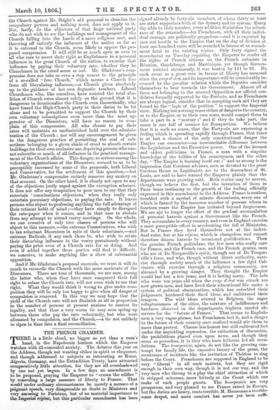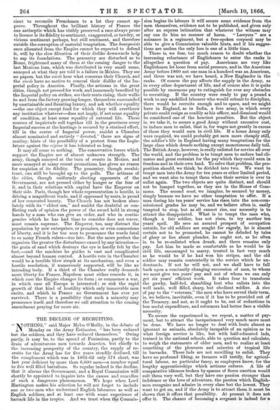11114 FRENCH CHAMBER.
is a little cloud, no bigger as yet than a man's rEhREand, in the Napoleonic horizon which the Emperor watches with ill-concealed anxiety. The debates this year on the Address, though not wanting either in spirit or eloquence, and though addressed to subjects so interesting as Rome, Algeria, Germany, and the Extradition Treaty, have attracted comparatively little attention, for they are all overshadowed by one not yet begun. In a few days an amendment is to be proposed, praying the Emperor to " crown the edifice " by conceding a large measure of liberty to France. That would under ordinary circumstances be merely a menace of a poignant speech, very disagreeable no doubt to Ministers and very amusing to Parisians, but of no material importance to the Imperial regime, but this particular amendment has been signed arready by forty.-six membeffi, of whom thirty at least are strict supporters both of the dynasty and its system.• Every day adds to their number, every addition diminishes the reluct- ance of the remainder—for Frenchmen, with all their indivi- dual courage, are politically gregarious—and it is expected by men not hostile to the Empire that on the day of division at least one hundred votes will be recorded in favour of an amend- ment fatal to the existing regime. Only forty signed the amendment on Tuesday requiring the Emperor to confer all the rights of French citizens on the French colonists in Reunion, Guadeloupe, and Martinique, yet though Govern- ment resisted strenuously, it was beaten by 141 to 91. No such event as a great vote in favour of liberty has occurred since the coup d'e'tat, and its importance will be considerably in- creased by the peculiar relation which the Deputies consider themselves to bear towards the Government. Almost all of them not belonging to the avowed Opposition are official can- didates formally supported by the Prefects, and as Frenchmen are always logical, consider that in accepting such aid they are bound by the " logic of the position " to support the Imperial view. Nothing but a strong sense either of danger to the country, or to the Empire, or to their own seats, would compel them to take a part in a "mutiny ;" and if they do take part, the omen is one full of menace for Bonapartism. We believe that it is such an omen, that the Forty-six are expressing a feeling which is spreading rapidly through France, that there is at last a chance of the only constitutional danger the Empire can encounter—an irreconcilable difference between the Legislature and the Executive power. One of the keenest and oldest politicians in France, a man with a singular knowledge of the foibles of his countrymen, said the other day, " The Empire is burning itself out ;" and so strong is the impression that Corsican advisers, men as devoted to the great Corsican House as Legitimists are to the descendant of Bt. Louis, are said to have warned the Emperor plainly that the departments were growing cold. Both stories may be untrue, though we believe the first, but the invention of them in Paris bears testimony to the growth of the feeling officially expressed in this amendment to the Address. France is restless, troubled with a myriad of minute discontents, every one of which is fanned by the immense number of persons whom in fourteen years the Empire has irritated beyond forgiveness. We are apt to forget the effect of the gradual accumulation of personal hatreds against a Government like the French. They accumulate in every country, and even in England exercise a most perceptible effect in accelerating the fall of Ministries. But in France they level themselves not at the indivi- dual ruler, but at his regime, which is changeless, and cannot therefore disarm hatreds by occasional gratifications. Then the genuine French politicians, the few men who really care for France, and the French race, and the French genius, men who are of De Tocqueville's spirit, though not of De Tocque- ville's force, and who, though without direct authority, exer- cise through society much of the influence a few rigid Cal- vinists will exercise through a religions community, are alarmed by a growing danger. They thought the Empire would last but a few years, and it is lasting many. The lads who were ten years old when the coup d'e'tat was struck are now grown men, and have lived their educational life under a system of political obscurantism, which has enfeebled their judgments, hardened their fixed ideas, and embittered their tempers. The wild ideas uttered in Belgium, the eager voluptuousness of the cities, the mixture of indifference and hardness observed in the departments, frighten careful ob- servers for the "future of France." That seems to English- men a very vague phrase, but Frenchmen feel it, and a danger to the future of their country once realized would stir them to more than protest. Classes less honest but still cultivated fret under the unyielding repression, the extinction of discussion, the prohibitions placed even upon news, and though they seem so powerless, it is they who have hitherto led all revo- lutions. The bourgeoisie, again, do not like the growing con- tempt for family life, the excessive luxury of the great, the recurrence of incidents like the invitation of Therese to sing before the Court. Frenchmen are supposed in England to be very " liberal " in all such matters, but they are rigid enough in their own way, though it is not our way, and the very men who throng to a play the chief attraction of which is stripped actresses, sneer bitterly at the Court which can make of such people guests. The bourgeoisie are very prosperous, and very pleased to see France raised in Europe, but the duties are heavy, rents terrible, M. Haussman a trouble- some despot, and mere comfort has never yet been suffi- cient to reconcile Frenchmen to a lot they cannot ap- prove. Throughout the brilliant history of France the one antiseptic which has visibly preserved a race always prone to licence is its fidelity to sentiment, exaggerated, or tawdry, or vicious sentiment perhaps, but still sentiment, and therefore outside the corruption of material temptation. The bourgeoisie once alienated from the Empire cannot be expected to defend it, will by the slow filtration of their dislike downwards help to sap its foundations. The peasantry are disturbed as to Rome, frightened many of them at the coming danger to the last Mexican loan, which was distributed in very small sums, annoyed at what they are told is a failure in Mexico. They see no papers, but the curls hear what concerns their Church, and the cure's have no motive to conceal their dislike of the Im- perial policy in America. Finally, the artisans in the great cities, though not pressed for work, and immensely benefited by the Imperial policy on strikes, see their rents rising, their walks to and from the factory growing longer, themselves surrounded by unattainable and flaunting luxury, and ask whether equality —the one object except food for which they will overthrow any institution whatever—does not imply, if not some equality of condition, at least some equality of external life. These sources of inquietude roll together till in the provinces every Imperial success at the hustings is secured by a strained effort, till in the centre of Imperial power, amidst a Chamber almost nominated and entirely " devoted," there are signs of mutiny, hints of the possibility of a protest from the Legis- lature against the regime it has tolerated so long.
It may all come to nothing. The conservative forces which support the Empire are of almost unknown strength. The army, though annoyed at the turn of events in Mexico, and more annoyed at many recent promotions, has given no reason for suspicion of its fidelity. The peasantry, though recalci- trant, can still be brought up to the polls. The artisans of the cities, though uniformly electing opponents of the Government, are not pressed either by hunger or the fear of it, and in their relations with capital have the Emperor on their side. Paris, though her whole representation is hostile, is driving a magnificent trade, and if oppressed by rents, is proud of her renovated beauty. The Church has not broken abso- lutely with its " eldest son," and amidst the doubtful or con- flicting rush of opinion the power of the sword held in strong hands by a man who can give an order, and who in contin- gencies which he has had time to consider does not waver, must remain supreme. The Emperor, too, may distract the population by new enterprises, or promises, or even concessions of liberty, and it is far too soon to pronounce the words fatal to so many French rulers—too late. But the more perfect the organism the greater the disturbance caused by any intrusion— the grain of sand which destroys the eye is hardly felt by the foot,—and the machine he guides is vast and complicated almost beyond human control. A hostile vote in the Chamber would be a terrible blow struck at its mechanism, and even a hostile resolution, if numerously supported, will be like an intruding body. If a third of the Chamber really demands more liberty for France, Napoleon must either concede it, in which case the Empire changes its form ; or commence a war, in which case all Europe is interested ; or risk the rapid growth of that kind of hostility which only immovable men excite, and which in France no Government has ever yet survived. There is a possibility that such a minority may pronounce itself, and therefore we call attention to the coming amendment praying for more air.































 Previous page
Previous page